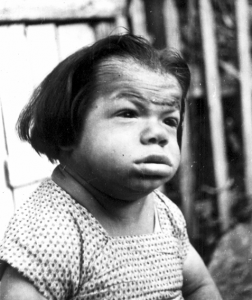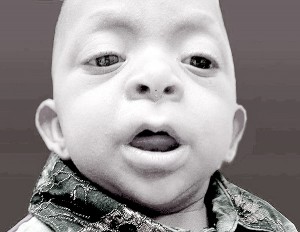Cretinism Definition
Page Contents
The term ‘Cretinism’ refers to severe hypothyroidism during birth [1] (deficiency of thyroid hormone) leading to stunted physical and mental growth.
It is also known as:
- Congenital hypothyroidism
- Congenital Iodine-deficiency Syndrome [2]
- Salt Deficiency Syndrome
In children aged 2 years or above, the disease is referred to as primary hypothyroidism.
Cretinism Epidemiology
The exact prevalence and incidence statistics are unknown. However, many people are supposed to be affected by this disease the world over. Severe thyroid deficiency is noted in 3,000-4,000 infants in countries like North America, Europe, Australia and Japan.
Cretinism affects all populations and affects females twice more than males.
Cretinism Types
Cretinism is classified into the following two types:
Endemic cretinism
It has the highest prevalence and arises due to insufficient dietary iodine intake. It is common in areas with iodine-deficient soils. This form is regarded as a major public health problem in many countries [3].
Neurological Cretinism
It is caused by thyroid deficiency in moths during the first and second trimesters of pregnancy. This leads to fetal iodine deficiency and consequent thyroid insufficiency, leading to neurological problems like inability to hear and perform motor functions and brain damage.
Myxedamatous Cretinism
Mental detainment is less severe in this form than in Neurological cretinism. It is marked by a number of abnormal effects, such as myxedematous (dry) skin, infrequent hair and a protruding abdomen.
Cretinism Symptoms
In people with Cretinism, the following abnormal physical characteristics may be noted:
- Foreshortened base of the skull
- Low hair line
- Short and wide face
- Pallor [4]
- Underdeveloped mandible
- Overdeveloped maxilla
- Large, thick and protruding tongue (Macroglossia)
- Delayed eruption of primary and permanent teeth
- Short and thickened long bones
- Late appearing of epiphyses
- Irregular and deformed epiphyses (in some cases)
Some signs become apparent during early infancy itself, and include:
- Gradual development of a coarse, dry skin
- Mild inflammation of face and tongue
- Umbilical hernia
- Drooling from an open mouth
- Listlessness
- Slow movement
- Constipation
- Myxedema
- Feeding difficulties and choking
Mental retardation becomes apparent in the later stages and is manifested by problems like retarded learning ability and reduced intelligence. The effects in such phases involve:
- Breathing difficulties (Dyspnea)
- Inactivity
- Heart valve abnormality
- Jaundice
- Slow pulse (Bradycardia)
- Excessive sleeping
- Blandness
- Little crying
Newborns with Cretinism can be of normal weight and height. But if left untreated, patients may have stunted growth to the point of dwarfism. Bones and muscles may also degenerate.
Cretinism Etiology
Lack of thyroid hormones is the cause. Thyroid deficiency may result from:
- Iodine deficiency (in developing nations)
- Impaired thyroid gland (in developed countries)
- Hereditary condition interrupting thyroid synthesis (inheriting analogous genes causing thyroid gland to manufacture less thyroid hormones)
- Intake of antithyroid drugs during pregnancy (uncommon)
Dietary iodine deficiency during pregnancy [5] is a chief cause in many parts of the world.
Cretinism Risk Factors
The risk factors include:
- Being female
- Being of Hispanic origin
- Being white-complexioned (ratio is lower among blacks)
Cretinism Diagnosis
It is typically detected within a week after birth [6]. Hormone levels in infants are tested. If deficiency is observed, a thyroid scan is performed to evaluate the thyroid gland.
In some cases, diagnostic tests such as x-rays and ultrasound tests may be used. The findings of these imaging exams may be useful for differential diagnosis and to avoid misdiagnosis.
Cretinism Treatment
If Cretinism is confirmed by tests, hormone replacement therapy is used in the form of oral thyroxine. The treatment should ideally be initiated within the first few weeks of life and continued throughout life. The doses should be increased or reduced whenever deemed as appropriate.
Cretinism Complications
The complications include:
- Permanently stunted physical development
- Impaired mental abilities
- Abnormal enlargement of the thyroid gland (goiter)
Irreversible changes may occur unless treatment is initiated with the first 6 weeks of life.
Cretinism Prognosis
When treated early, the outcome is good. Newborns diagnosed and treated within the first few weeks after birth generally have normal intelligence. Late-treatment or non-treatment causes delayed growth and intellectual disability [7].
Death is uncommon in patients who receive medical treatment. Life expectancy is average in most Cretinism sufferers.
Cretinism Prevention
As endemic cretinism arises from a dietary iodine deficiency, iodine administration has been established as a health policy in many countries. Screening of newborns can help detect the disorder in the first trimester of pregnancy [8]. Adequate dietary iodine intake by pregnant mothers can also prevent Cretinism in infants.
Cretinism Pictures
The images below show the appearance of Cretinism sufferers.
Picture 1 – Cretinism
Picture 2 – Cretinism Image
Cretinism ICD9 Code
The ICD9 Code for Cretinism is 243.


